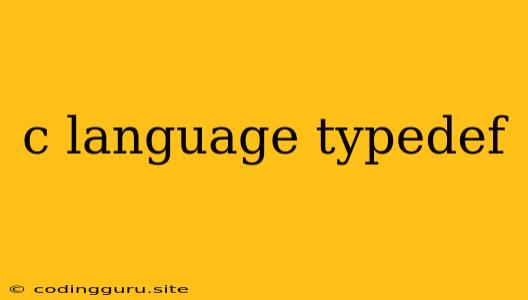Understanding typedef in C: A Comprehensive Guide
The typedef keyword in C is a powerful tool that allows you to create aliases or synonyms for existing data types. It provides a way to make your code more readable and maintainable, especially when working with complex data structures.
What is typedef?
typedef is a storage class specifier that allows you to define new names for existing data types. It doesn't create a new data type, but rather gives an existing type a new name. Imagine it like a nickname for a friend - you're using a different name to refer to the same person.
Why use typedef?
Here are some key reasons why you might want to use typedef in your C code:
1. Improved Readability:
Imagine you're working with a complex structure like a linked list. Instead of writing struct node *head;, you can use typedef to define an alias:
typedef struct node Node;
Node *head;
This makes your code more readable and easier to understand.
2. Portability:
Sometimes, you need to use platform-specific data types. typedef can help make your code more portable by abstracting these platform-specific types. For instance, you might use typedef to define INT32 or UINT64 based on your target architecture.
3. Code Maintainability:
Let's say you need to change the underlying data type in your code. If you've used typedef, you only need to change the typedef definition, not every instance of the original data type.
4. Simplifying Complex Types:
typedef can simplify the declaration of complex data structures. Consider a function that takes a pointer to a structure as an argument:
void function(struct my_struct *data);
Using typedef can make this simpler:
typedef struct my_struct MyStruct;
void function(MyStruct *data);
5. Creating Custom Data Types:
While typedef doesn't technically create new data types, it can give the appearance of doing so. By defining aliases for complex data structures, you can make your code more structured and organized.
How to Use typedef
The basic syntax for using typedef is:
typedef existing_type new_type;
Example:
typedef int integer; // Defines integer as an alias for int
Example with Structures:
typedef struct {
int age;
char name[50];
} Person;
// Now you can use Person instead of struct { ... }
Person person1;
person1.age = 30;
strcpy(person1.name, "John Doe");
Tips for Using typedef Effectively
- Be Descriptive: Choose aliases that clearly indicate the purpose of the data type.
- Consistency: Stick to a consistent naming convention for your aliases.
- Avoid Conflicting Names: Ensure your new aliases don't clash with existing C keywords or standard library names.
Conclusion
typedef is a valuable tool for C programmers, offering several advantages: improved readability, code portability, easier maintenance, and simplified data type declarations. By effectively using typedef, you can enhance the clarity and maintainability of your C code.
